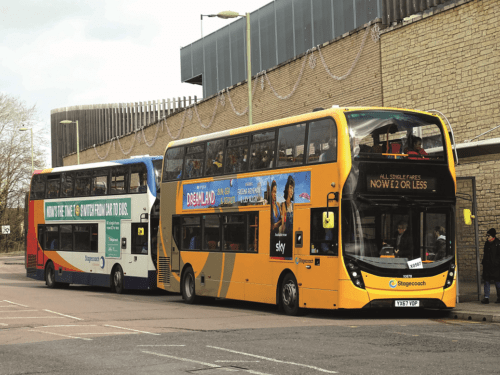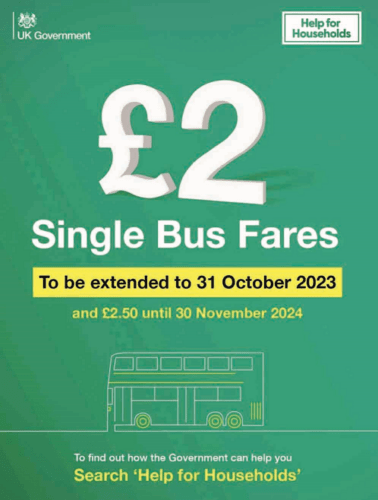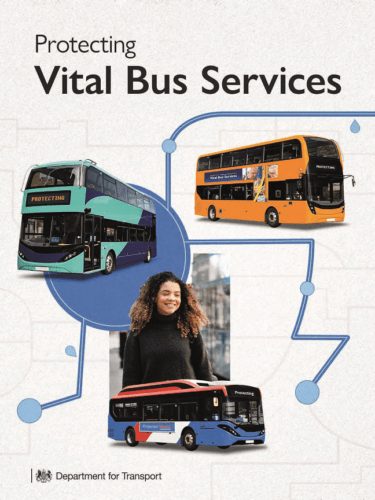
The funding boost is designed to support the bus sector’s long-term recovery, and takes total investment for buses to more than £3.5 billion since March 2020
Passengers across England will continue to ‘Get Around for £2’ thanks to a further £500 million in Government funding, which it says will support people with the cost of living and ensure long-term stability in the sector.
The Transport Secretary Mark Harper announced on 17 May that the Government would provide £300 million to ‘protect vital routes’ and improve services from now until 2025. To help with cost of living pressures and save on everyday travel costs, the Government will also provide up to £200 million to continue capping single bus fares at £2 outside London until the end of October 2023 and then at £2.50 until 30 November 2024, when it will review their effectiveness and make a decision on whether to provide further bus fares incentives.
The Office for Budget Responsibility (OBR) estimates that inflation will be halved by the end of this year, and the Government believes that capping fares at £2.50 until November 2024 will create longer-term certainty for bus users over the next year. The Government says the move is an essential part of its Help for Households initiative to support people with the increased cost of living, and will particularly benefit those on lower incomes who take nearly three times as many bus trips than those on higher incomes.
Prime Minister Rishi Sunak said: “By extending the £2 fare cap, we’re making sure bus travel remains accessible and affordable for everyone while helping to ease cost of living pressures. Buses connect our communities and play a vital role in growing the economy; they transport people to work, take our kids to school and make sure patients can get to doctors’ appointments. That’s why we’re determined to protect local routes and encourage more people onto the bus, ensuring people can get around easily and in an affordable way.”
Transport Secretary Mark Harper commented: “Taking the bus is the most popular form of public transport and millions of people rely on these vital services every day. That’s why we’re investing half a billion pounds to help people save money amid cost of living pressures and continue to level up transport in all parts of the country, doing our bit to help halve inflation and grow the economy.”
The Government says that although initially introduced as a temporary measure, since it started on 1 January the £2 fare has encouraged more people to use the bus. Operators such as Go-Ahead report that they have carried more than 16 million passengers at £2 since 1 January 2023, giving on average a third off fares. Operators that are continuing to participate in the the £2 fare cap scheme are yet to be confirmed.
The additional funding will be shared between local transport authorities and operators, and aims to protect and improve routes across England as well as to help return the bus sector to a long-term sustainable financial footing. The new funding models will protect vulnerable routes while allowing local authorities and operators to determine the routes that work for local areas, the Government says. Of the £300 million allocated to support services until 2025, £160 million will be provided to local transport authorities to improve fares, services and infrastructure while £140 million will go directly to operators to help protect essential services across England.
The Government says it is continuing to work closely with the sector to support local areas in dealing with changing travel patterns while managing pressures on the taxpayer.

Industry response
Responding to the fare cap extension, Rebecca Fuller, Interim Director at the Urban Transport Group, said: “The Government’s decision to extend bus funding to 2025 offers a degree of longer-term certainty and brings to an end the stop-start approach that has dominated Government support for the bus since the pandemic.
“However, we are yet to learn the crucial details around how local transport authority funding will be shared across the country and the extent to which this will depend on past allocations, such as Bus Service Improvement Plan (BSIP) funding. It seems likely that there will be winners and losers from this announcement and we are keen to ensure that our urban areas have the funding they need to not only safeguard, but to also transform bus services as envisaged in the National Bus Strategy. To achieve this ambition, buses must do more than survive, they must be enabled to thrive.”
Luke Marion, Oxford Bus Group Managing Director said: “The further extension of the £2 fare capping scheme is excellent news for passengers and the bus industry. We have seen a positive impact on patronage thanks to the scheme and it has not only helped passengers continue to get out and about, but it has also helped operators maintain services. I hope the offer continues to encourage more people to give bus travel a try.
“Having longer visibility on Government funding is also great news as it will help bus operators plan with more clarity and confidence and continue to maintain and develop good quality, reliable bus services.”
CEO of the Confederation of Passenger Transport Graham Vidler welcomed the news: “We welcome this two-year funding settlement. It shows a recognition of the value of buses to the economy and to local communities. It will enable bus operators and local authorities to plan, promote and grow services with greater confidence.
“However, the combination of the funding settlement and the £2 fare cap extension will not save every service in every part of the country. Operators and local authorities will now work together to study the detail of the Government’s proposals and ensure that the funding is used to safeguard the best possible network for local passengers.”
Ongoing funding
The latest funding announcement continues the Government’s programme of support for the bus sector. In 2021, as part of its National Bus Strategy plans, it asked all English local transport authorities outside London to set out their Bus Service Improvement Plans (BSIP) explaining their local visions for the step-change in bus services that are needed to put passengers back at the heart of the network. Since then, over £1 billion has been awarded to 34 counties, city regions and unitary authorities to deliver service improvements, bus priority measures and ambitious fares initiatives, including local fare caps in Greater Manchester, West Yorkshire and Liverpool City Region.
In addition, £5.7 billion investment has been provided to eight mayoral combined authorities in England to support integrated, cross-modal transport networks over the next five years through the City Region Sustainable Transport Settlement (CRSTS), including supporting bus infrastructure.


